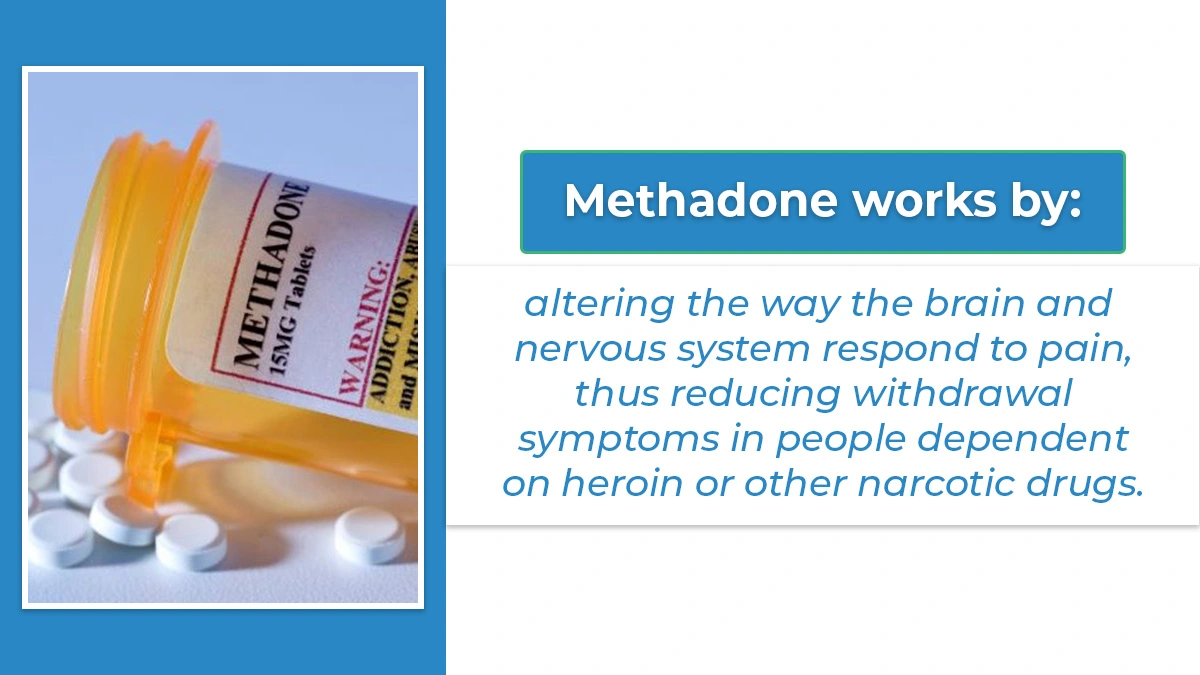
Examples Of Dual Diagnosis
Explore the examples of dual diagnosis and its treatment plans for better outcomes with The Recovery Team-Newton.

Methadone, a synthetic opioid, is primarily used to alleviate severe pain and to aid in the treatment of opioid addiction. Despite its significant role in managing opioid dependence, methadone itself can lead to addiction, making it a contentious and complex substance in the realm of addiction treatment.
When it comes to methadone, balancing its therapeutic benefits with the risks of dependence underscores the importance of comprehensive addiction management strategies that consider the individual’s holistic well-being.
Methadone should be used carefully and as prescribed, as misuse can lead to addiction and other health risks. Here’s what you need to know:
Contact The Recovery Team-Newton at (508) 978-2772 for information and personalized medical help to embrace long-term sobriety.
If you or a loved one are experiencing methadone addiction, there are key indicators that treatment is necessary. These include developing tolerance and experiencing withdrawal symptoms, signaling physical dependency.
In cases where attempts to quit have failed due to cravings and withdrawal, professional help is essential. Additionally, if methadone use negatively impacts relationships, work, or other life areas, it’s time to consider treatment.
Health concerns, such as respiratory or heart problems or mental health disturbances, should also prompt seeking medical and psychological support.
When a loved one is struggling with methadone addiction, your support can make a significant difference. Begin by expressing your concern non-judgmentally and letting them know you’re there to provide support.
Research various treatment options and facilities specializing in methadone addiction recovery to be prepared. Encourage your loved one to seek professional help from healthcare providers or addiction specialists.
Offer emotional support throughout their recovery journey while setting boundaries to protect yourself and others. Educate yourself about methadone addiction and recovery to better understand their situation and provide more effective support.
While methadone can be an effective tool in opioid addiction treatment when used as prescribed, it also has the potential for abuse and addiction.
Here are some of the main causes and risk factors for methadone addiction:
Methadone is also used to manage chronic pain. For individuals prescribed methadone for pain management, there is a risk of developing addiction, as they may experience increased tolerance and the need for higher doses to achieve the same pain relief.
Over time, this can lead to dependency and addiction.
Studies suggest that psychological factors, including stress, trauma, and other mental health disorders, can contribute to methadone addiction. Individuals experiencing emotional distress may turn to methadone as a coping mechanism, leading to dependence and addiction.
Social and environmental factors, such as peer pressure, familial history of substance abuse, and easy access to methadone, can contribute to the development of addiction. Exposure to an environment where methadone use is normalized or encouraged can increase the risk of addiction.
Genetic factors can play a significant role in the development of methadone addiction. Individuals with a family history of substance use disorders may be genetically predisposed to addictive behaviors, making them more susceptible to developing methadone addiction.
Several risk factors can contribute to the development of methadone addiction:
Some of the risk factors for methadone addiction include:
Individuals with a history of substance abuse, particularly opioids, are at a higher risk of developing methadone addiction. Prior exposure to addictive substances can increase the likelihood of dependency on methadone.
Co-occurring mental health disorders, such as depression, anxiety, or post-traumatic stress disorder, can increase the risk of methadone addiction. Individuals may misuse methadone as a way to self-medicate or alleviate symptoms of their underlying mental health condition.
Researchers claim that people lacking strong social support networks or experiencing social isolation may turn to methadone as a means of coping with feelings of loneliness or despair, thereby increasing the risk of addiction.
Easy access to methadone, either through illicit sources or lax prescription practices, can increase the risk of addiction. Accessibility facilitates the misuse and abuse of methadone, leading to the development of addiction among vulnerable populations.
While methadone can be effective in reducing withdrawal symptoms and cravings, it is important to be aware of the potential side effects that can occur with long-term use of methadone.
Some common side effects of methadone include:
Pregnant women should consult their healthcare provider and the FDA-approved guidelines for using methadone tablets during pregnancy to ensure the safety of both the mother and the baby, as long-term use of methadone can have serious side effects on the health of both the pregnant woman and her newborn.
Treating methadone addiction involves a comprehensive approach that addresses both the physical and psychological aspects of addiction.
Here are some methadone treatment options and strategies for recovery:
Inpatient or residential treatment programs provide a structured and supportive environment under medical attention for individuals struggling with methadone addiction. These programs typically offer a combination of medical and therapeutic interventions to address the physical and psychological aspects of addiction.
In some cases, individuals may be transitioned from methadone to another medication for opioid use disorder, such as buprenorphine. Medication-assisted treatment (MAT) can help reduce cravings and withdrawal symptoms while minimizing the risk of overdose.
Evidence-based therapies like Cognitive-Behavioral Therapy (CBT) and Contingency Management are often used to help patients address the underlying psychological factors contributing to their opioid medicines and to develop healthier coping strategies.
Support groups are a good option to get rid of illicit opioid use. Participation in support groups, such as Narcotics Anonymous (NA) or SMART Recovery, can provide a sense of community and ongoing support during recovery from opiate addiction.
Methadone is an FDA-approved prescription drug with a high potential for addiction treatment. It has a long half-life, making it suitable for daily dosing. Methadone can be prescribed to individuals with opioid addiction to help reduce drug cravings and withdrawal symptoms, allowing them to regain stability in their lives.
However, caution is needed as it can transfer to breast milk, impacting newborns at birth.
Methadone is a synthetic opioid medication primarily used to treat opioid addiction, such as heroin or prescription painkillers. It helps reduce life-threatening withdrawal symptoms and cravings, making it easier for individuals to stop using these drugs.
Methadone dose is administered under medical supervision and can be part of a comprehensive treatment plan to support recovery from opioid dependence.
Methadone, when taken as prescribed for opioid addiction, doesn’t produce a euphoric “high” like other opiates. Instead, it typically provides a sense of normalcy and relief from withdrawal symptoms, which can include anxiety, restlessness, and pain.
The experience is generally stable and doesn’t induce the intense euphoria associated with opioid abuse. However, misuse or taking too much methadone can lead to a feeling of euphoria or drowsiness.
Methadone is commonly prescribed by doctors to individuals with dependence on opioid drugs as part of a medication-assisted treatment (MAT) program. It helps manage withdrawal symptoms and cravings, making it easier to transition away from illicit opioids.
Additionally, it can be used for pain management in cases where other pain medications are ineffective or produce intolerable side effects.
Say goodbye to the chains of drug abuse and embark on a journey toward a life full of happiness and freedom with The Recovery Team-Newton.
Our partial hospitalization treatment program provides a structured and intensive environment for individuals who require comprehensive care. In contrast, our outpatient program offers flexibility for those who need to balance treatment with daily responsibilities.
In addition, our dual diagnosis treatment digs deeper to tackle the root causes, helping you unveil your true potential.
Let us be your partners in this incredible transformation. Call us at (508) 978-2772, rewrite your story, and rediscover the joy of living.

Explore the examples of dual diagnosis and its treatment plans for better outcomes with The Recovery Team-Newton.

Explore how long drug rehab programs are with the complete guide from The Recovery Team-Newton.

How much does drug rehab cost without insurance? The Recovery Team-Newton explains financing options and resources.